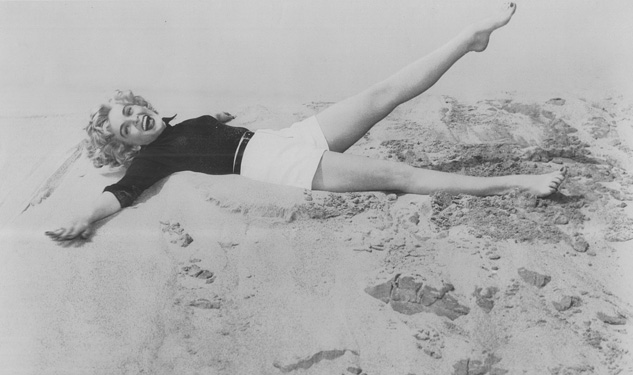
- Industry
Lizabeth Scott (1922-2015)
Sultry actress Lizabeth Scott (1922-2015), who just died in Hollywood of heart failure, was the star of a classic film noir that the Hollywood Foreign Press Association helped the Film Noir Foundation restore in 2013.
Scott was born Emma Matzo in Scranton, Pa. in 1922 into a large family of Ukrainian immigrants. Her mother wanted her to become a journalist, but she refused, saying that she would become a theater actress or a nun. Her mother relented, and young Emma went to New York, changed her name, worked as a model and studied acting. As Scott, she appeared on Broadway and toured, got rave reviews, and turned down Hollywood offers. When she finally came West, she landed a contract with the major independent producer Hal B. Wallis, who was working out of Paramount Studios. Her sultry looks, sculpted cheekbones, blond hair and smokey, come hither voice landed her numerous roles in noir films, during the 1940s, the heyday of that American film genre. She was often billed as Paramount’s answer to Veronica Lake or Lauren Bacall, even though she never matched their success. Still, she got to costar with a long ‘A’ list of male leads: Humphrey Bogart, Kirk Douglas, Burt Lancaster, Robert Mitchum, Dick Powell and Charlton Heston. Just the titles of some of her films (she made 22 in her career) give the flavor of their lurid plots: The Strange Love of Martha Ivers, Dead Reckoning, Pitfall, Dark City, I Walk Alone, The Racket, Bad for Each Other, Paid in Full, Stolen Face, Two of a Kind and No Time for Tears. Too Late for Tears (1949) stars Scott, Dan Duryea, and Arthur Kennedy, (a Golden Globe winner for Trial, 1956.) For many years, all the original 35mm prints were believed lost, but the UCLA Film & Television Archive restoration lab mixed and matched various surviving prints, to create a fresh, clean print. Scott plays Jane Palmer, a decent woman turned bad when a bagful of money literally falls into her lap. When Tears was first released, The New York Times reviewer called Scott’s character-cash-hungry dame who doesn’t let men or conscience stand in her way, and concluded that the movie “is an adult and generally suspenseful adventure … Scott gives a riveting performance.”
“Scott’s Jane’s drive for wealth is so extreme that she will not stop at murder to rise above her impoverished middle-class circumstances, and her warped character is used to show how money can’t buy one happiness. The husky-voiced, winsome, smiling Lizabeth Scott turns in a finely tuned performance as the femme fatale”.
Scott was plain spoken and tough herself. During her active working career, she said: “When you say ambition to me – that’s when you get me started! My greatest ambition is to be the whoppingest best actress in Hollywood. You can’t blame a girl for trying! I don’t want to be classed as a ‘personality,’ something to stare at. I want to have my talents respected, not only by the public but by myself.”
As film noir lost its appeal in the 1950s, Scott tried other genres. She appeared with Dean Martin and Jerry Lewis in a comedy, with Elvis Presley in a musical. But unlike Bacall, Scott’s movie career died. Ironically, her last film, Pulp (1972) was a send-up of film noir.
She retired, remained in Los Angeles, developed real estate, but mostly kept to herself and her charity work, volunteering and raising funds for various causes from Project Hope to the Los Angeles County Museum of Art. She said: “I love not having the eyes of the world on me … I never understood adulation from strangers when I was making movies. Basically I’m shy and always have been … The privilege of being a screen actor is having the opportunity of seeing yourself as others see you. Believe me, it is very traumatic. When I saw myself, I thought ‘Get a train ticket and leave’. My dream then, my joy now, is to be alone – to lock my apartment door and not even answer the phone.”
Of all her films Too Late for Tears was Lizabeth Scott’s personal favorite, and the HFPA is proud of having supported its restoration and keeping her legacy alive.
Yoram Kahana

